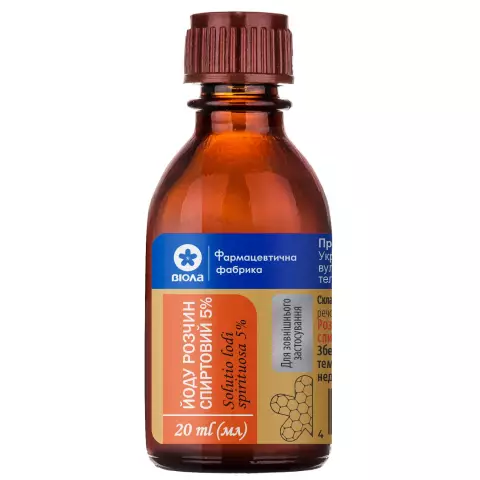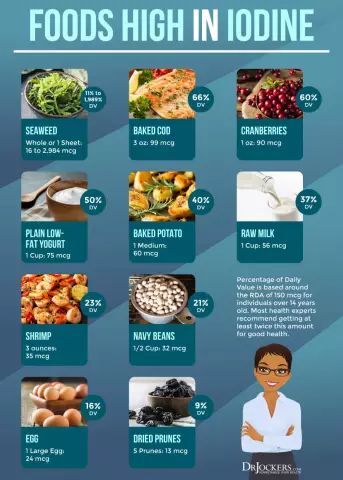- Author Rachel Wainwright wainwright@abchealthonline.com.
- Public 2023-12-15 07:39.
- Last modified 2025-11-02 20:14.
Iodine
Iodine: instructions for use and reviews
- 1. Release form and composition
- 2. Pharmacological properties
- 3. Indications for use
- 4. Contraindications
- 5. Method of application and dosage
- 6. Side effects
- 7. Overdose
- 8. Special instructions
- 9. Application during pregnancy and lactation
- 10. Drug interactions
- 11. Analogs
- 12. Terms and conditions of storage
- 13. Terms of dispensing from pharmacies
- 14. Reviews
- 15. Price in pharmacies
Latin name: Iodum
ATX code: D08AG03
Active ingredient: iodine + [potassium iodide + ethanol] (iodum + [kalii iodidum + spiritus aethylicus])
Producer: Yaroslavl Pharmaceutical Factory, LLC "Lekar", Tula Pharmaceutical Factory, PFC "Obnovlenie", LLC "Hippocrat", LLC "Fito-Bot", Kazan Pharmaceutical Factory, Vladivostok Pharmaceutical Factory, Omsk Pharmaceutical Factory, Samaramedprom, Permpharmacy, CJSC "Rostov Pharmaceutical", Moscow pharmaceutical factory and others, Russia
Description and photo update: 2019-13-08
Prices in pharmacies: from 14 rubles.
Buy

Iodine is a drug with local irritating, antiseptic and anti-inflammatory effects.
Release form and composition
Iodine is released in the form of a solution for external use of alcohol 5%: a red-brown transparent liquid with a characteristic odor (in dark glass ampoules, 1 ml each with an ampoule knife, 10 ampoules in a cardboard box; in bottles of 3, 5, 10, 15, 25, 50, 100, 250, 500, 1000 ml, 1 bottle in a cardboard box).
The active substance is a part of 1 ml of alcohol solution: iodine - 50 mg.
Pharmacological properties
Iodine has pronounced antimicrobial properties. It is characterized by a noticeable local irritating effect in relation to any tissues of the body, and in significant concentrations it has a cauterizing effect. This is due to the ability of the substance to precipitate tissue proteins.
Pharmacodynamics
In iodides and elemental iodine preparations, the features of the resorptive action remain the same. The most intense effect of iodine on the functioning of the thyroid gland. With iodine deficiency, iodides can eliminate disturbances in the synthesis of thyroid hormones. With a sufficient concentration of iodine in the environment, iodides reduce the production of thyroid hormones, reduce the sensitivity of the thyroid gland to the TSH of the pituitary gland and block the processes of its synthesis in the pituitary gland.
Also, iodine affects the metabolism by enhancing the processes of dissimilation. In atherosclerosis, they help to reduce the content of beta-lipoproteins and cholesterol in the blood and increase the lipoproteinase and fibrinolytic activity of blood serum, reducing the rate of blood coagulation.
Iodine is accumulated in syphilitic gums, ensuring their softening and resorption. However, the accumulation of the substance in tuberculous foci causes a more intense course of the inflammatory process. With the release of iodine through the excretory glands, an increase in secretion and irritation of the glandular tissue are observed. When used in small doses, this explains the stimulation of lactation and the expectorant effect of the drug. However, in significant doses, iodine preparations can provoke suppression of lactation.
Pharmacokinetics
Upon contact with the skin or mucous membranes, iodine is converted by about 30% into the form of iodides, and the rest is in the form of active iodine. The substance is partially absorbed, penetrating into tissues and organ systems, as well as being selectively absorbed by the thyroid gland. Iodine is excreted mainly through the intestines, kidneys, mammary and sweat glands.
Indications for use
- Diseases of the mucous membranes and skin of an inflammatory nature;
- Atherosclerosis;
- Myositis;
- Neuralgia (as a distraction)
- Tertiary syphilis.
Contraindications
Contraindications to the use of the drug: nephrosis, nephritis, pulmonary tuberculosis, chronic pyoderma, furunculosis, acne, urticaria, hemorrhagic diathesis, pregnancy, age up to 5 years (for oral administration), hypersensitivity to the components of the drug.
Instructions for use of Iodine: method and dosage
Outwardly, iodine is used by applying it to damaged skin areas.
Inside the drug should be taken after meals, adding a single dose to milk.
As a rule, the drug is prescribed for adults:
- Atherosclerosis (treatment): 10-12 drops, 3 times a day;
- Atherosclerosis (prevention): 1-10 drops 1-2 times a day (it is recommended to carry out 2-3 courses per year for 30 days each);
- Tertiary syphilis (treatment): 5-50 drops 2-3 times a day.
The maximum single dose is 20 drops, the daily dose is 60 drops.
Children from 5 years old should take 3-5 drops 2-3 times a day (for younger children, the drug is not prescribed internally).
Side effects
During the use of Iodine, iodism may develop, manifested in the form of a runny nose, Quincke's edema, salivation, lacrimation, acne on the skin and some other symptoms.
Overdose
In case of an overdose, burns, skin irritation, and manifestations of iodism are possible. In this case, it is necessary to wash off the remnants of the drug with clean running water and undergo a course of symptomatic therapy.
special instructions
Before you start taking an alcoholic solution of iodine inside, as well as with the development of uncharacteristic symptoms, you should consult a doctor.
Influence on the ability to drive vehicles and complex mechanisms
According to the instructions, Iodine in the recommended doses does not adversely affect the ability to drive vehicles or perform traumatic types of work that require increased concentration of attention and speed of reactions.
Application during pregnancy and lactation
Taking an alcoholic solution of iodine inside is contraindicated during pregnancy and lactation.
Drug interactions
There are no data on the interaction of iodine with other drugs.
Analogs
Iodine analogs are: Fukortsin, Green diamond solution, Lugol, Iodopiron, Iodinol.
Terms and conditions of storage
Store in a dark place, out of reach of children, at a temperature not lower than 0 ° C.
The shelf life is 3 years.
Terms of dispensing from pharmacies
Available without a prescription.
Reviews about Yoda
Numerous reviews about Yoda are positive. The drug disinfects the skin well, helps with nail fungus, eliminates inflammation in neuralgia and myositis.
Also, the drug is widely used for cosmetic purposes. Some women use it to remove unwanted hair, while others use it to make homemade cosmetics, face creams with a rejuvenating effect, and strengthening masks for nail plates and hair.
However, according to reviews, undiluted iodine can only be applied pointwise. If you lubricate the skin or nails with a solution in its pure form, you can not only aggravate the problem, but also get a severe burn.
Iodine price in pharmacies
The average price for iodine (5% alcohol solution) is 15-42 rubles (for a 10 ml bottle) or 20-50 rubles (for a 25 ml bottle), depending on the manufacturer.
Iodine: prices in online pharmacies
|
Drug name Price Pharmacy |
|
Iodine 5% solution for external use alcohol 10 ml 1 pc. RUB 14 Buy |
|
Iodine 5% solution for external use alcohol 10 ml 1 pc. RUB 15 Buy |
|
Iodine 5% solution for external use alcohol 10 ml 1 pc. RUB 17 Buy |
|
Iodine 5% solution for external use alcohol 25 ml 1 pc. 19 RUB Buy |
|
Iodine 5% solution for external use alcohol 25 ml 1 pc. RUB 23 Buy |
|
Iodine 5% solution for external use alcohol 25 ml 1 pc. RUB 24 Buy |
|
Iodine 5% solution for external use alcohol 10 ml 1 pc. RUB 25 Buy |
|
Iodine Felt-tip pen Lekker 5% 5 ml 1 pc. RUB 25 Buy |
|
Iodine 5% solution for external use alcohol with a spatula 10 ml 1 pc. RUB 55 Buy |
|
YoSen Iodine and Selenium tablets 50 pcs. 151 RUB Buy |
|
Iodine Endocrinol 0.33 g capsules 30 pcs. 284 r Buy |
|
VitaMishki Multi + iodine + choline 2400 mg assorted chewable lozenges 60 pcs. 333 r Buy |
|
VitaMishki Multi + iodine + choline 2400 mg assorted chewable lozenges 30 pcs. 342 r Buy |
|
Turamine Iodine 0.2 g capsule 90 pcs. 349 r Buy |
|
Solgar Iodine from Kelp and Potassium Iodide Tablets 250 pcs. 1573 RUB Buy |
| See all offers from pharmacies |

Anna Kozlova Medical journalist About the author
Education: Rostov State Medical University, specialty "General Medicine".
Information about the drug is generalized, provided for informational purposes only and does not replace the official instructions. Self-medication is hazardous to health!






